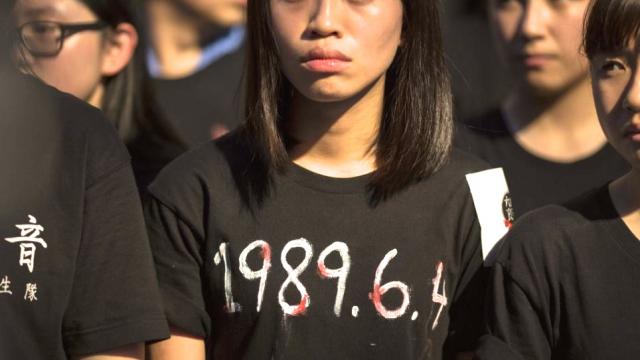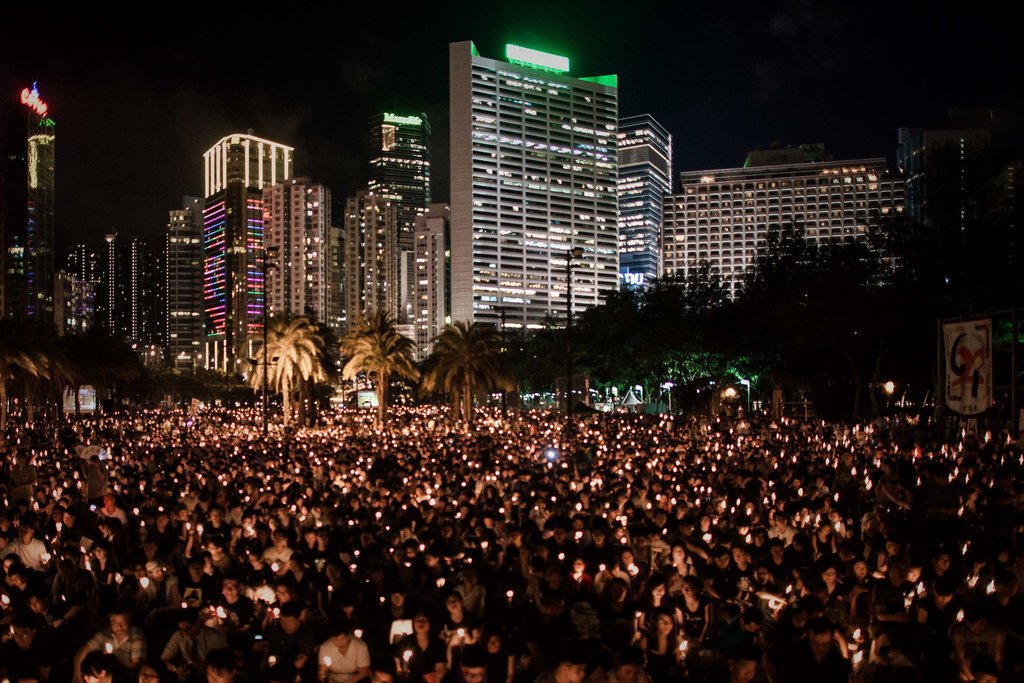
Tens of thousands of people gathered at a candlelit vigil in Hong Kong on Wednesday to commemorate the Tiananmen Square crackdown, while tight security in Beijing and a pre-emptive strike against activists prevented the public from marking the 25th anniversary.
Police flooded the heart of the Chinese capital, with hundreds of uniformed and plainclothes officers carrying out identity checks at the site of the 1989 pro-reform protests. Some foreign media were ordered to leave or were prevented from entering the square.
Censors deleted online posts, blocked searches for sensitive terms and blacked out television screens when foreign broadcasters covered the anniversary. Users of LinkedIn, one of the few foreign social media services not blocked in China, complained that it had censored posts about the anniversary or related detentions.
Relatives of some of the hundreds or even thousands of victims of the 1989 crackdown were allowed to mourn at their graves, but only under police escort, said Zhang Xianling of the Tiananmen Mothers group.
"The wound is still very deep … We must pursue justice for our loved ones," Zhang, whose teenage son Wang Nan was killed, told Associated Press. Dozens of activists and other critics were placed under house arrest or detained by the authorities in the runup to the anniversary of the massacre. Others were told to leave Beijing.
In Hong Kong, where residents enjoy greater freedoms under the "one country, two systems" principle, crowds packed into Victoria Park to listen as the names of victims were read out. Organizers said a record 180,000 people took part, while police put attendance at just under 100,000.
Rany Cao, a 30-year-old participant from the mainland, told AP: "The reason that I've come here is that I want to see the sunshine of freedom. I expect to learn more about the truth of what happened 25 years ago."
While organizers once feared the vigils were dwindling as time went by, they have drawn increased crowds in recent years, including many too young to recall the events of 1989.
Another, smaller vigil took place in Taipei. Those in attendance included Wu'er Kaixi, a prominent student leader now living in exile in Taiwan.
"The Chinese government has tried their best to remove all elements of people remembering it. They have managed to keep it away from all the media and social media – but that's needed because people refuse to forget," he said.
He added that the Chinese government still needed to address public discontent over issues such as rampant corruption.
"In 1989 they made the worst possible choice. Today I am still hopeful – but not very optimistic – the regime will realize they have already run out of options," he said.
The official verdict on the protests condemned the "counter-revolutionary riot." But student leaders sought reform rather than to overthrow the Chinese Communist party.
The protests quickly drew support from workers and even parts of the Chinese the party, drawing millions on to the streets of Beijing and other cities across China at their height.
Maya Wang, of Human Rights Watch, said more people had been affected by this year's crackdown, and more detained by police and even charged, rather than placed under house arrest.
She added: "The government fears any acknowledgement or discussion of the incident would undermine the legitimacy of their version of events.
"Most people in China today don't want to talk about Tiananmen, believe in the official verdict or don't know about it – generally there's silence except for from a small minority of activists trying to keep the memory alive. But the same issues raised 25 years ago continue to dominate the grievances people raise today."
An editorial in an English language edition of the state-run populist newspaper Global Times, which often covers more sensitive material than the Chinese version, said: "China has shielded relevant information in a bid to wield a positive influence on the smooth development of reform and opening up."
The article, not carried in the Chinese edition, added: "Chinese society has never forgotten the incident 25 years ago, but not talking about it indicates the attitude of society."
The White House urged Beijing to account for those who had been killed, detained or gone missing in connection with the 1989 crackdown and said it honored the memories of those who died.
"The United States will always speak out in support of the basic freedoms the protestors at Tiananmen Square sought, including the freedom of expression, the freedom of the press and the freedoms of association and assembly," the White House press secretary said.
The UN high commissioner for human rights, Navi Pillay, has expressed concern for those held in the runup to the anniversary, adding: "I urge the Chinese authorities to immediately release those detained for the exercise of their human right to freedom of expression."
In Dharamsala, India, the Dalai Lama offered prayers for those who died and urged China to embrace democracy.
Chinese foreign ministry spokesman Hong Lei said the Dalai Lama had "ulterior motives" for his remarks. Hong also expressed anger at the comments from the US and the UN, saying they interfered in China's internal affairs and that Pillay's comments "grossly [go] against her mandate".
3 WAYS TO SHOW YOUR SUPPORT
- Log in to post comments














